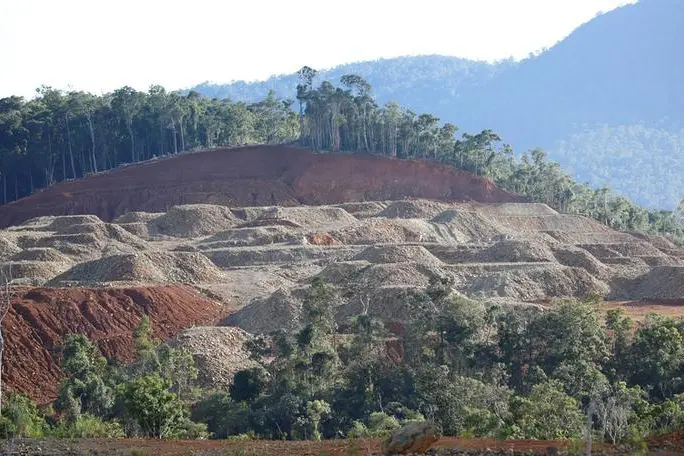PHOTO
With the government's continued pitch for investments in mineral processing, several foreign investors have already expressed interest in the country, according the chief of the Department of Trade and Industry (DTI).
On the sidelines of the Mining Philippines International Conference and Exhibition, Trade Secretary Alfredo Pascual said investors from the United States, Japan and China have expressed interest for mineral processing projects in the country.
'It's in the process, but investments like these, which involve multi billion dollars, take some time,' Pascual said when asked when these investments are expected to materialize.
'Then also the setting up of the plants will take time as well as they integrate technological processes,' he said.
Pascual said the projects mainly involve nickel processing, noting that the mineral is associated with the electric vehicle supply chain.
Pascual said details of the project are still being discussed.
'First they will agree on technology. Then they have to agree on sourcing of power. They set up their own power generating capacity within the premises of the plant processing plant or they'll get from the grid,' Pascual said.
During the conference, Pascual highlighted the country's abundant reserves of the green metals with 2.1 billion metric tons of nickel, 6.9 billion metric tons of copper, and 260,000 metric tons of cobalt.
'At this time, we can offer investors a golden opportunity to serve both regional and global markets in a way that is not just profitable but profoundly impactful,' Pascual said.
'As the Philippines aims to strategically position itself in the regional and global value chains of electric vehicles and batteries, it is essential to recognize the suitability of Philippine nickel ores for battery applications, mainly as battery-grade materials for cathodes,' he added.
'The electronics industry, too, can experience a boost. The Philippines has already shown strengths in electronics manufacturing. With a local supply of essential metals like gold, copper, and rare earth elements, we can climb up the value chain from merely assembling products to producing intricate components, thereby capturing more value within our borders,' Pascual said.
He lamented that for years, the country has been exporting raw ores to other countries, effectively giving away not just the country's natural resources but also the opportunity to add significant value to them.
'When we export these raw ores, we send off potential jobs, technological advancements, and a vast range of socio-economic benefits that could otherwise contribute to our national economy. In doing so, we allow other nations to profit from our natural endowments, as they add value to these raw materials and sell them back to us at a premium,' Pascual said.
'Refined metals can be worth three to 10 times more than their raw, unprocessed forms. By establishing our own processing plants, we could create thousands of high-skilled jobs, encourage technological innovation, and build competitive industries serving domestic and international markets,' he said.
Moreover, Pascual shared that the DTI is pushing for the development of the green metals sector by advocating for value-added downstream mineral activities in the segment of battery precursor production used for electric vehicles (EV) batteries and battery energy storage system (BESS).
He explained that the DTI has launched various initiatives, such as the Trade and Industry Development Talks for the green metals sector. This initiative is anchored on the global transition to clean energy technologies, championing the promotion and development of green metals.
'Additionally, we are implementing the Master Development Plan for the Leyte Ecological Industrial Zone (LEIZ) as a potential hub for mineral processing. The proposed LEIZ is supported by the presence of a copper smelting plant and the availability of a geothermal power supply and sulfuric acid for a high-pressure acid leaching (HPAL) plant to produce the EV battery precursors,' Pascual said.
In a statement yesterday, the Board of Investments (BOI) said it recently led the meeting of the Copper National Technical Working Group (CNTWG) members, affirming that the crafted work plans of each Sub-Technical Working Group are in line with the overarching goal of establishing the LEIZ.
'Identified as one of the flagship projects of the BOI, the LEIZ is proposed to be the first ecological industrial zone in the country that aims to promote the clustering of copper and copper-related industries guided by the principles of circular economy and ecological industrial parks,' the BOI said.
The LEIZ MDP Project is expected to channel numerous economic benefits not only to the Province of Leyte but also to the entire Region VIII. The project is one of the possible measures to bridge the gap in the local copper value chain and propel the full integration of the industry from mining to downstream processing as envisioned in the Copper Industry Roadmap.
The CNTWG's primary function is to oversee the implementation of the Philippine Copper Industry Roadmap (CIR) including related projects and activities, as well as address industry concerns that hinder the industry's development, among others.
Copyright © 2022 PhilSTAR Daily, Inc Provided by SyndiGate Media Inc. (Syndigate.info).





















